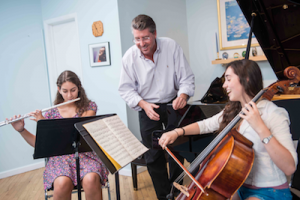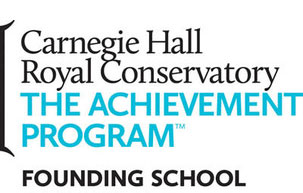Suzuki Program - Frequently Asked Questions
The Larchmont Music Academy Suzuki Program brings the joy and power of music to children and their families around the community. Through mindful and creative exercises, the Suzuki philosophy is a highly regarded and recognized way of music education. For more information about the program and its approach, read the answers to frequently asked questions below.
What is the Suzuki Method?
The Suzuki approach to talent education is based on the idea that talent is not something that is innate, but something that can be nurtured and developed. It is an approach to learning that teaches children how to learn. It helps them develop concentration, patience, and an appreciation for detail.
What is the Mother Tongue Method?
More than 60 years ago Shinichi Suzuki, a Japanese violinist, asked himself: If every child learns to speak a language fluently, why can’t every child learn to speak the language of music fluently? Japanese is very difficult, as is English, Russian, French, and all languages, but no parent has ever said, “I do not think my child is talented enough to learn to speak.” On this realization the Mother Tongue Method was born and became the basis for his entire system of music education. Now Suzuki can be found in all parts of the world, bringing music to many generations of children and families.
Why is it important that the child/family listen to the CD?
Listening is an integral part of the Suzuki approach to learning. If the child knows the songs already, if they are “in his ear”, they will be that much easier to play on the instrument. Imagine trying to pick out the notes for Happy Birthday on the piano, assuming that you were unfamiliar with the instrument. You would know when you had found the correct notes, as you would know what they “should” sound like. Now imagine being unfamiliar with both the instrument and the song. The difficulties would be much greater! As Suzuki himself states “Children should listen to the reference recordings every day at home to develop musical sensitivity. Rapid progress depends on this listening.”
What is Every Child Can (ECC) and why it is a requirement of all Suzuki parents?
The Every Child Can is an introduction to the philosophical ideas behind the Suzuki approach to talent education. It is a chance for parents to learn about the world wide community of Suzuki, and it is also a great way to meet fellow Suzuki parents.
Why is the parent required to have four (4) private lesson before the child starts lessons?
Children are great imitators. They mimic their parents, and when they see that their parents are enjoying and excited about learning, they want to join in the process. It is also of tremendous importance that the parent have at least a cursory understanding of the functionality of the instrument that their child is learning. Though we do not expect the parents to become skilled instrumentalists (although continuing lessons is always encouraged!) the parent will have a better sense and an easier time guiding their child during the home practice.
What is a home teaching assistant? And why must that person (typically a parent or grandparent) attend all lessons and group classes?
One of the key elements of the Suzuki approach is the “Triangle” concept. The three points to the triangle are the parent, the teacher, and the child. These three points support each other. If the parent is at every lesson, they will understand what is expected of the child for the next lesson. The parent will remember details better than the child, and they will be able to help guide the child’s practicing at home. Parents are also better equipped to remember problems that may arise during the home practice, and bring these to the teacher’s attention at the next lesson.

What is the purpose of a group class?
Group class is a time to build the musical community that is an integral part of Suzuki learning. It is a fun and enriching time for both students and parents. It is a chance for the students to meet each other, to see that other children are working on the same things, to play for their peers, and to hear their peers. It is a time to develop ensemble playing skills, listening, cooperation, turn-taking, and group problem solving. For parents, it is a great chance to see both the struggles and the successes that other parents and children experience.
Will my child learn how to read music?
Yes. Although the early stages of the Suzuki approach lean more on memorization and listening than on note reading, as Suzuki teachers, we also integrate a good amount of theoretical study - a complete understanding of music reading is taught along with this. Remember that a child does not learn how to speak by learning how to read!

